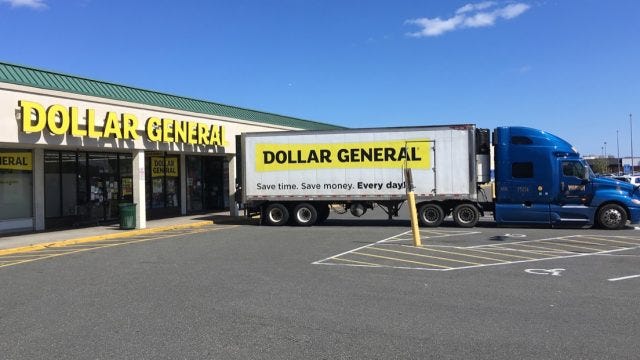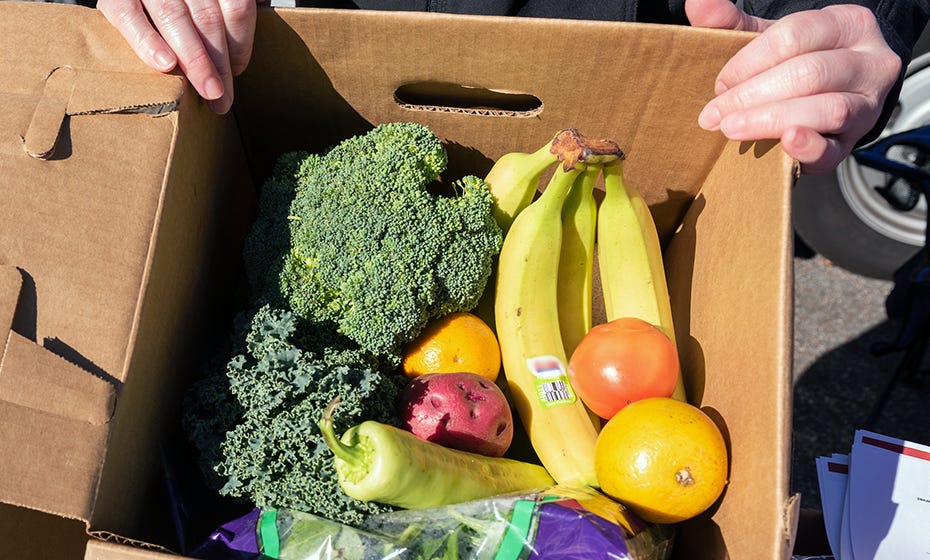Dollar stores have an image problem. They have been accused of targeting and exploiting poorer communities, driving other food retailers out of business, and blocking new grocery stores from moving in.
But when it comes to reducing food insecurity, dollar stores can be part of the solution. Not because they sell food at budget prices (which they do), but because their parking lots would serve as ideal nutritional assistance distribution sites for federally subsidized fresh food box programs around the country.
Why partner with dollar stores?
I’ll be honest, I don’t like shopping in dollar stores all that much. Some are better than others. But the worst ones are cramped, disorganized, and woefully understaffed. However, I’m self-aware enough to realize that my shopping preferences are a luxury. I have the means to shop elsewhere, so I do.
In my research on food access, I interviewed primary household shoppers at their kitchen tables and on their front porches about how, where, and why they buy the food that their family consumes at home. The people I talked with did not have nearby grocery store options. They lived in what the USDA used to call “food deserts” and now calls “low food access and low income” neighborhoods. But putting aside the debates on what to call these areas, they share one thing in common, they have dollar stores.
Dollar stores are now the fastest-growing food retailers in the United States. Dollar stores primarily target a working class clientele. In America, where over 75 million people live in households earning less than $35,000 a year, that makes for an ample customer base.
So, whatever you think of dollar stores, let’s put any disagreements aside for a moment and think about how to make the best use of the food system we have while we work to build the food system we want.
Food assistance often adds extra burdens to those who can least afford it.
The most inefficient part of delivering food aid is the handoff to the person in need. Delivering healthy food boxes door to door is overly expensive. Decentralized pick up locations increase efficiency, but still requires recipients to make an extra trip (which incurs transportation time and costs). A better solution is to disseminate donated food in locations where recipients already visit on a regular basis so that they can combine their weekly chores/tasks.
Churches and schools serve as good examples of distribution sites that serve multiple purposes. Many parents and congregation members need nutritional assistance, and putting a box of food in their trunk after they pick up their child or attend services enables them to accomplish two tasks during one trip. However, not all food insecure have school age children, nor do they all worship in the same place. The trick is finding the one venue where all residents in under resourced areas visit on a regular basis.
How dollar stores can help
Dollar Stores are the one place that nearly all food insecure already go to or travel past on a regular basis. This is not a random occurrence. This is the dollar store business plan: they offer big-box store prices in smaller format venues closer to residential areas.
Dollar Stores are able to offer such low prices because of their streamlined distribution networks. Bulk purchases made at the corporate level are separated and repacked in regional warehouses before standardized deliveries are made to individual stores. It is not the low quality of items that makes them so cheap (convenience stores sell low quality items with much higher price tags) it is the economy of scale that tractor-trailer deliveries can offer.
This isn’t secret information, the site requirements for Dollar General, Family Dollar and Dollar Tree are all publicly available. They all require ample parking with easy ingress and egress. The dollar store business model is—at its core—a real estate strategy: they target medium sized lots just big enough to accept deliveries via maximum sized trucks.
Which makes them ideal locations for distributing fresh food nutritional assistance. for four main reasons:
They are everywhere
They have the space
Fresh food assistance would not compete with their existing offerings
They need the PR
Rise of “healthy food box” programs
Fresh foods are the costliest, and healthiest, portion of every family’s food budget. Fruits and vegetables are also the first items to get crossed off the list when times are tight. Local food pantries typically most often only offer non-perishable food; and when they do have fresh food in stock, it is often recently “rescued” from a local supermarket and set to expire within days.
As a result, there has been a renewed focus on providing fresh food to address food insecurity. This has taken the form of “double up your bucks” campaigns to subsidize purchases at local farmers markets, “food as medicine” prescription produce boxes, and more recently USDA GusNIP funded healthy food incentives.
Dollar stores have the space to serve as distribution sites for these “healthy food box” style programs. Their parking lots are overbuilt to enable large scale deliveries a few times each week. Providing healthy and fresh food assistance in the parking lot would essentially transform the nutritional offering of a dollar store location into the equivalent of a small scale grocery store once or twice a week. Pairing the two would save recipients of food assistance time and money.
Offering fresh food assistance in dollar store parking lots would not cut into that location’s sales. Dollar stores aren’t built to sell fresh food. Fruits and vegetables require their own storage space and the type of open air display coolers that American customers demand are expensive to purchase and maintain. It is true that some dollar store brands have experimented with healthier offerings, but when it comes to food offerings their strategy is to focus on a limited variety of dried, canned, and frozen goods in uniform store layouts across the country.
Offering up parking lot space, even if it would have otherwise gone unused, would incur some costs for dollar stores. Enabling food assistance providers to operate on company property would likely require legal agreements to mitigate any liabilities should an accident occur. However, the benefits of such a partnership would outweigh any economic or legal risks. Mobile health clinics have secured access to Dollar General parking lots in Nashville, so the idea is not without precedent.
Quite honestly, dollar stores need some good press. Local governments have passed or are considering moratoriums on new stores across the country. Partnering with local non-profits and giving them some space to deliver services to those in need would go a long way towards restoring dollar stores’ reputation as a low cost and convenient retail source in areas where larger supermarkets typically avoid.







